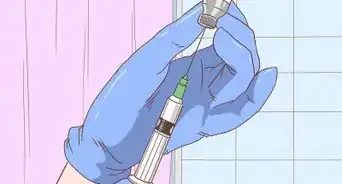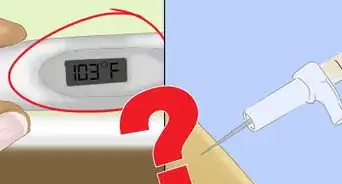This article was co-authored by Chris M. Matsko, MD. Dr. Chris M. Matsko is a retired physician based in Pittsburgh, Pennsylvania. With over 25 years of medical research experience, Dr. Matsko was awarded the Pittsburgh Cornell University Leadership Award for Excellence. He holds a BS in Nutritional Science from Cornell University and an MD from the Temple University School of Medicine in 2007. Dr. Matsko earned a Research Writing Certification from the American Medical Writers Association (AMWA) in 2016 and a Medical Writing & Editing Certification from the University of Chicago in 2017.
There are 18 references cited in this article, which can be found at the bottom of the page.
This article has been viewed 28,185 times.
Cytomegalovirus (CMV) is part of the herpes virus family, including the herpes simplex viruses and the viruses that cause infectious mononucleosis (Epstein-Barr Virus) and chickenpox. CMV is common and worldwide, can infect almost anyone, and once you're infected it stays in your body for your lifetime. Healthy children and adults rarely have symptoms or any illness from CMV. However, babies and those with weakened immune systems can experience serious problems from CMV, and pregnant mothers can pass the infection to their infant before birth.[1] There’s no cure for CMV, but recognizing symptoms and knowing preventative practices can help to protect yourself and others from the virus and its consequences.
Steps
Looking Out for Congenital CMV
-
1Check for CMV if your baby was born early or too small. Look for symptoms of CMV at birth. Babies who are infected by CMV in the womb do not always have symptoms – in fact, they usually do not. However, If your baby is born premature, born with low birth weight, or born below average size, CMV is a possible cause.[2]
- CMV is part of the TORCH infections that affect women when they are pregnant.[3] These infections can cause birth defects and are congenitally acquired. There is significant risk for morbidity and mortality from these infections.
- Congenital cytomegalovirus (CMV) infection is the leading cause of sensorineural hearing loss. Further, there are long-term neurodevelopmental disabilities associated with congenital CMV including the following: cerebral palsy, intellectual disability, vision impairment, and seizures.
-
2Recognize if your baby has an abnormally small head. Small head size, or microcephaly, can occur if your baby is exposed to toxins, certain viruses – including CMV – or suffers from malnutrition in the womb. It occurs due to abnormal brain development, and can be diagnosed by your OBGYN when your baby is born.[4]Advertisement
-
3
-
4Notice if your baby is jaundiced at birth. Jaundice, yellowing of the skin and whites of the eyes (also known as scleral icterus), indicates a problem with liver function. The liver is commonly affected by CMV and may also be enlarged.[6]
- Hepatosplenomegaly, or enlargement of the spleen and liver, is another concern that may result due to congenital CMV infection.
-
5Look for other CMV symptoms if your baby gets pneumonia shortly after birth. There are many causes of pneumonia, but if it occurs in a baby that was just born it may be a symptom of CMV infection. Pneumonia requires treatment with antibiotics no matter what, but you should ask your doctor about the possibility of CMV infection.[7]
-
6Consider dark splotches on your baby’s skin a warning sign. Like pneumonia, rashes can occur for many reasons. If your baby is born with a rash or with dark patches of discoloration on their skin, speak with your doctor and ask about CMV.[8]
-
7Watch out for delayed hearing loss. This is also known as sensorineural hearing loss. Some babies who appear healthy at birth end up developing symptoms of congenital CMV later in infancy, even months or years after they are born. Hearing loss is the most common symptom that has a late onset.[9]
- Vision loss can also occur.
-
8Notice if your child develops problems with strength or coordination. Another late-onset problem can be the development of muscle weakness. Due to problems with brain development, poor coordination can occur late. If your child begins to stumble often, drop objects more often, or becomes unable to lift things they used to be able to, see a doctor right away.[10]
-
9Consider CMV as a cause for mental disabilities. CMV infection can, in infancy or after several years, cause intellectual delay or disabilities. It’s important to take your child to the pediatrician regularly to ensure they are reaching appropriate stages of growth and development.[11]
Recognizing Symptoms in the Immunocompromised
-
1Get tested for CMV if you have mono-like symptoms. People with weakened immunity who get CMV infection usually present with symptoms very similar to mononucleosis, or “mono.” Mono is caused by the similar Epstein-Barr Virus. Fatigue, body aches, fever, sore throat, headache, swollen glands in the neck, and enlarged spleen are tell-tale signs.[12]
-
2Notice if your vision is changing. Infection with CMV can cause loss of vision in immunocompromised adults, and can even lead to blindness. CMV retinitis is a well known complication of CMV infection in those with HIV. Make sure that you seek immediate medical care if you experience sudden worsening of vision.[13]
-
3Test for CMV if you see blood in your stool. CMV infection can cause ulcers in the stomach and intestines. You might see blood in your stool if this is the case, and may have stomach pain after eating. Diarrhea is also common with CMV infection.[14]
- Losing blood through ulcers in the digestive tract can lead to anemia, or low iron. It’s common to experience fatigue if you’re anemic.
- CMV colitis is uncommon in immunocompetent patients. It is usually a reactivation of latent CMV in those with weakened immune systems.
-
4Be wary of lung infections. CMV can cause pneumonia, severe infection in the lung or lungs, in people with compromised immunity. There are many other causes in this population, as well, but be sure to get tested for CMV if you develop pneumonia.[15]
- Symptoms of pneumonia include cough, shortness of breath, fever, fatigue, loss of appetite and weight loss.
-
5Watch out for signs of liver problems. Like in newborns, it is possible for adults to become jaundiced if their liver is dysfunctional. However, adults are more likely to experience inflammation of the liver due to CMV, which causes the liver to enlarge (also known as hepatomegaly). This is called viral hepatitis. Other than jaundice, symptoms may include swelling in the abdomen, nausea and abdominal pain, and itching.[16]
-
6Suspect CMV infection if you develop seizures or feel confused. CMV infection in those with poor immunity can cause inflammation of the brain known as encephalitis. This can lead to changes in mental status (feeling confused, having trouble staying awake), coma, or seizures. If you have a seizure, get tested for CMV; if you experience any change in your level of consciousness or ability to think, get emergency medical care.
Managing a CMV Infection
-
1Wait it out if you’re generally healthy and have minor mono-like symptoms. Healthy people rarely experience symptoms of CMV. Initial infection or a reactivation – the virus coming out of dormancy to cause symptoms – usually presents like mono. Symptoms are usually mild and resolve within three weeks – but have a general awareness of the possibility of CMV infection.[17]
- Like with mono, there’s not much to do but wait it out and take care of yourself in the mean time. Healthy people rarely get seriously ill from CMV infection, so you probably don’t need to visit your doctor.
- Rest, hydrate, and take nonsteroidal anti-inflammatories (NSAIDs) like Tylenol for aches and pains. Symptoms usually resolve on their own.
-
2Seek medical care if you experience severe inflammation symptoms. Rarely, individuals with CMV infection who are otherwise healthy will experience more severe illness with potential health complications. This is why knowing when you might have CMV is helpful – you can be on lookout for these possible problems and seek immediate medical care if they develop:
- Inflammation in your intestines causing fever, stomach pain, diarrhea, and bloody stool.
- Brain inflammation (encephalitis) with subsequent changes in mental status.
- Hepatitis and poorly functioning liver.
- Inflammation of the lungs (pneumonitis), which can cause cough, difficulty breathing, and low appetite causing weight loss.
-
3See your healthcare professional immediately if you have low immunity and any symptoms of CMV. Any of the above signs should send you running to your doctor if you have weakened immunity. The immunocompromised should also be extremely cautious even about what seems like low-grade illness, such as symptoms associated with mono. Infection with CMV in this population can be deadly, so when in doubt seek immediate care.[18]
- CMV is a big concern in those with HIV and weakened immune systems, while it poses little risk to those who are healthy.
-
4Get treated with antiviral drugs if your doctor recommends it. There is no cure for CMV. If an individual does need treatment, the most common medications used are antiviral drugs. Antiviral drugs ganciclovir and valganciclovir are being used for patients with weakened immune systems.[19] Researchers are studying new medications to treat CMV, but those are not currently available.
- Because of the strong side effects, ganciclovir should only be considered for infants with severe congenital CMV disease. Nursing mothers should stop breastfeeding while taking this medication.
- For some, CMV can be life-threatening – newborn babies, children with HIV/AIDS, or those being treated for cancer or having organ transplants. These cases might need hospitalization and treatment with intravenous (IV) antiviral drugs.[20]
- Patients receiving bone-marrow transplants might also benefit from getting CMV-immune globulin (CMV-IVIG)[21]
-
5Get tested for CMV if you’re pregnant. Most of the time, CMV is dormant in healthy people – which means it is present in the body, but causes no illness. However, because the consequences of CMV in newborns can be so severe, pregnant women should all get tested for CMV. If you’ve been infected and your body has made antibodies, you will probably not infect your child. CMV can cross the placenta, though, so any new infection could be spread to the baby in the womb.[22]
- If you’re pregnant and have a new CMV infection, or any abnormality is detected on ultrasound, your doctor might want to do an amniocentesis to determine if your baby is infected. This procedure extracts and tests some amniotic fluid from the pregnant mom.
- See your doctor for CMV testing especially if you get an illness while pregnant that feels like mononucleosis (“mono”) – sore throat, fatigue, swollen glands in the throat, and fever.
- Breastfeed your baby without fear. It’s true that breastmilk is a fluid that can pass along CMV virus, but of all things breast milk least commonly makes the baby sick. Lactating mothers with CMV can still breastfeed. Doctors suggest that the positive effects of breastfeeding outweigh the possible risks of passing CMV to the baby.[23]
-
6Get your baby tested within three weeks from birth, if applicable. Any mother with known CMV infection should certainly have their baby tested for CMV, and since the infection is so common it’s good practice for every baby to be tested regardless. Doctors can test your baby for CMV by using their urine, blood, or saliva. Be sure to have the test done within two to three weeks of your baby’s birth to ensure accurate results.[24]
-
7Schedule consistent follow-ups with your baby’s doctor, if applicable. If you tested positive for CMV during your pregnancy or your baby has tested positive, you should regularly see your baby’s doctor even if no symptoms are present. The doctor will need to perform regular hearing and vision tests to make sure no problems are developing.[25]
Preventing CMV Infection
-
1Practice frequent hand washing. The best way to prevent CMV infection is with good hygiene, so wash your hands frequently and thoroughly. There is no vaccine for CMV, though researchers are testing a vaccine for women in their childbearing period.[26]
- Be extra careful to wash your hands if changing diapers or are in contact with babies’ saliva.[27]
-
2Limit contact with bodily fluids. CMV can be transmitted through bodily fluids like saliva. Hence, it is important to avoid touching a child’s saliva or tears, clean children's toys well, disinfect surfaces that are exposed to saliva or urine.[28] You should also use condoms during sex as CMV can be transmitted through semen and vaginal fluids.
- Kiss a child on the cheek rather than the mouth, especially if you’re pregnant.
- Carefully clean any toys that your child drools on.
-
3Don’t share food or dishware with others. As with so many other viruses, avoiding sharing food, drinks, and silverware with others will minimize your exposure to CMV.[29]
-
4Get regular CMV testing if you’re immunocompromised. If you have weak immunity for some reason, get regular monitoring even if you show no signs of illness - you want to be on the lookout CMV as much as possible. You should have regular hearing and vision screenings. Your doctor may also want to monitor the level of antibodies to CMV your body is making by doing a simple blood test.[30]
References
- ↑ https://www.health.gov.au/resources/pregnancy-care-guidelines/part-g-targeted-maternal-health-tests/cytomegalovirus
- ↑ https://www.cdc.gov/cmv/congenital-infection.html
- ↑ http://emedicine.medscape.com/article/235213-overview
- ↑ https://familydoctor.org/condition/cytomegalovirus/
- ↑ http://www.cdc.gov/cmv/congenital-infection.html
- ↑ https://www.msdmanuals.com/home/children-s-health-issues/infections-in-newborns/cytomegalovirus-cmv-infection-in-newborns
- ↑ https://www.msdmanuals.com/home/children-s-health-issues/infections-in-newborns/cytomegalovirus-cmv-infection-in-newborns
- ↑ https://www.nhs.uk/conditions/cytomegalovirus-cmv/
- ↑ https://www.health.gov.au/resources/pregnancy-care-guidelines/part-g-targeted-maternal-health-tests/cytomegalovirus
- ↑ https://rarediseases.org/rare-diseases/cytomegalovirus-infection/
- ↑ https://www.betterhealth.vic.gov.au/node/1096
- ↑ https://www.aafp.org/afp/2003/0201/p519.html
- ↑ https://www.aao.org/eye-health/diseases/what-is-cytomegalovirus-retinitis
- ↑ https://www.health.harvard.edu/a_to_z/cytomegalovirus-cmv-a-to-z
- ↑ https://medlineplus.gov/ency/article/000664.htm
- ↑ https://www.health.harvard.edu/a_to_z/cytomegalovirus-cmv-a-to-z
- ↑ https://kidshealth.org/en/parents/cytomegalovirus.html
- ↑ https://www.nhs.uk/conditions/cytomegalovirus-cmv/
- ↑ https://www.betterhealth.vic.gov.au/node/1096
- ↑ http://kidshealth.org/en/parents/cytomegalovirus.html#
- ↑ http://kidshealth.org/en/parents/cytomegalovirus.html#
- ↑ https://familydoctor.org/condition/cytomegalovirus/
- ↑ https://www.aafp.org/pubs/afp/issues/2003/0201/p519.html
- ↑ https://www.health.state.mn.us/news/pressrel/2022/newborn020222.html
- ↑ https://www.health.nsw.gov.au/Infectious/factsheets/Pages/cmv-and-pregnancy.aspx
- ↑ https://www.betterhealth.vic.gov.au/node/1096
- ↑ https://www.health.nsw.gov.au/Infectious/factsheets/Pages/cmv-and-pregnancy.aspx
- ↑ https://www.health.nsw.gov.au/Infectious/factsheets/Pages/cmv-and-pregnancy.aspx
- ↑ https://www.health.nsw.gov.au/Infectious/factsheets/Pages/cmv-and-pregnancy.aspx
- ↑ https://rarediseases.org/rare-diseases/cytomegalovirus-infection/
About This Article
If you think you have cytomegalovirus, take note of any symptoms that are similar to mononucleosis, like fatigue, body aches, fever, sore throat, swollen glands, and an enlarged spleen. In addition to these symptoms, you should look for any loss of vision since the CMV infection is known to cause vision loss or even blindness in people with HIV. Since CMV infection can cause stomach and intestinal ulcers, watch for blood in your stool and stomach pain after eating. If you have any of these symptoms, go to a doctor immediately to get tested for CMV. While there is no cure for CMV, your doctor might recommend antiviral medications as a treatment. For more advice from our Medical co-author, including how to recognize CMV in newborns, scroll down.
-Step-1-Version-2.webp)
-Step-2-Version-2.webp)
-Step-3-Version-2.webp)
-Step-4-Version-2.webp)
-Step-5-Version-2.webp)
-Step-6-Version-2.webp)
-Step-7-Version-2.webp)
-Step-8.webp)
-Step-9.webp)
-Step-10.webp)
-Step-11.webp)
-Step-12.webp)
-Step-13.webp)
-Step-14.webp)
-Step-15.webp)
-Step-16.webp)
-Step-17.webp)
-Step-18.webp)
-Step-19.webp)
-Step-20.webp)
-Step-21.webp)
-Step-22.webp)
-Step-23.webp)
-Step-24.webp)
-Step-25.webp)
-Step-26.webp)

-Step-11-Version-2.webp)






-Step-13.webp)











-Step-11-Version-2.webp)






































Medical Disclaimer
The content of this article is not intended to be a substitute for professional medical advice, examination, diagnosis, or treatment. You should always contact your doctor or other qualified healthcare professional before starting, changing, or stopping any kind of health treatment.
Read More...